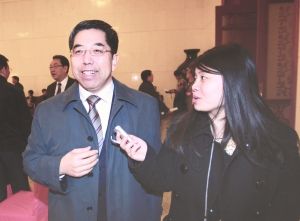Inflation pressures continue to ease
 0 Comment(s)
0 Comment(s) Print
Print E-mail China.org.cn, March 12, 2012
E-mail China.org.cn, March 12, 2012
Real interest rates" are likely to persist over the longer term as inflationary pressure continues to ease this year, Ma Jiantang, head of the National Bureau of Statistics, said on Sunday.
|
|
|
Ma Jiantang (L), head of the National Bureau of Statistics, is interviewed on the sidelines of the National People's Congress in Beijing. |
"As the country's rapid economic growth comes down to an appropriate level, inflationary pressure is also abating this year," Ma said on the sidelines of the National People's Congress in Beijing.
|
Don't miss: |
China entered the "negative deposit interest rate" era in February 2010 when the CPI hit 2.7 percent, exceeding the annual fixed deposit rate, which was 2.25 percent at the time.
A positive interest rate occurs when the annual fixed deposit rate exceeds the CPI.
Easing inflation reflects the impact of steps adopted last year, such as increasing the supply of products and better regulation of the logistics sector, Ma said.
He said the government is working to maintain the falling momentum of prices, so that positive deposit interest rates could be preserved. Premier Wen Jiabao said in the government work report delivered last week that the full-year inflation target for 2012 was within 4 percent.
Wu Xiaoqiu, an economist with Renmin University, said the falling CPI in February was in line with expectations, and the full-year target of 4 percent was "achievable".
Nevertheless, some experts warned that even though macroeconomic policies had gradually taken effect, upward price pressures would persist.
Peng Sen, vice-minister of the National Development and Reform Commission, said imported inflation was one of the factors that could still pose challenges to China's progress in curbing prices.
Peng said that commodity prices were decided by many factors beyond the control of the Chinese government, such as global economic and political conditions.
In an earlier interview with China National Radio, Ma warned that the government shouldn't lower its guard, as long-term factors could push up prices, such as increasing resource and labor costs.
Li Yining, an economist with Peking University, said that weather conditions, the situation in the pig farming industry and this year's supply of grains and vegetables also add risks.
"It (the CPI at 3.2 percent) is a good start, but no reason to relax," Li said.
Although the value of their bank deposits won't be eroded by inflation any longer, consumers didn't seem impressed.
A survey by phoenix.com found that 54.3 percent of the respondents avoided deposits when managing their money, because the returns were still low.







Go to Forum >>0 Comment(s)